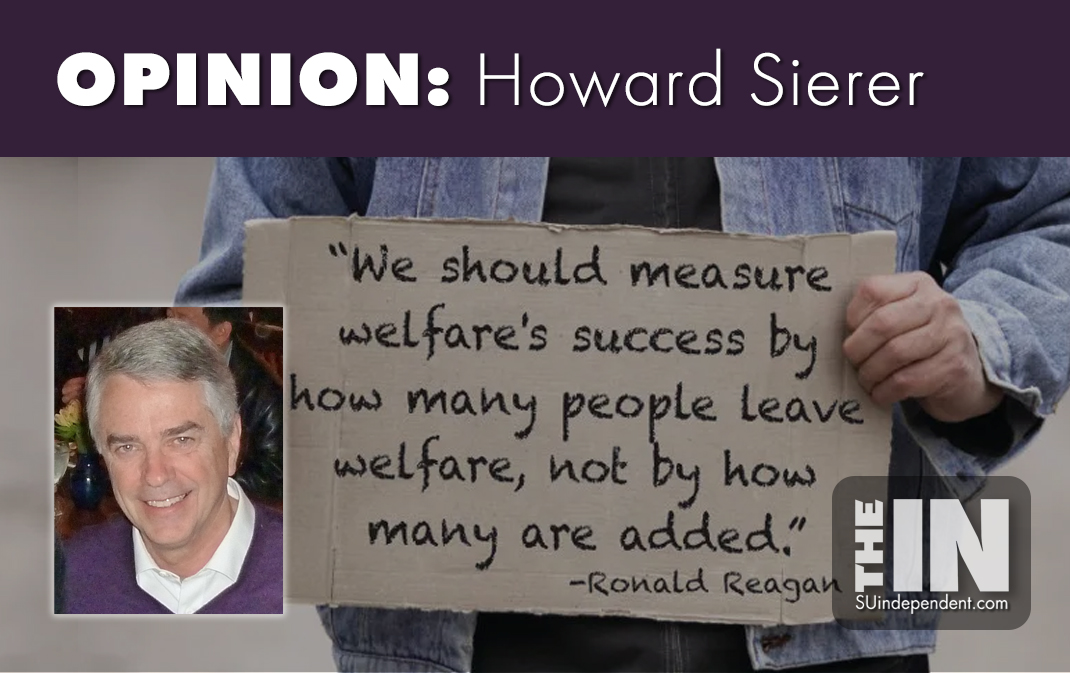
Welfare Work Requirements Long Overdue
– By Howard Sierer –
Roughly two-thirds of Americans, including half of Democrats, support work requirements for those receiving food stamps and Medicaid who are able-bodied and have no dependents at home. Welfare work requirements were included by Republicans in the federal debt ceiling bill enacted in June. Progressives, out-of-step with the public once again, are hysterical.
In 1996, Pres. Clinton signed the bi-partisan Personal Responsibility and Work Opportunity Reconciliation Act saying it will “make welfare what it was meant to be: a second chance, not a way of life.” Progressives hyperventilated then, forecasting destitute families with starving children being thrown into the street.
Once implemented, the act was hailed as a big success by all sides. As Clinton and the Republican Congress had predicted, welfare rolls declined precipitously from 5.1 million families in 1994 to just over 2 million in 2000. Follow-up research showed that after accounting for taxes and nonmedical in-kind transfers, poverty declined by 62% between 1995 and 2016.
Pres. Biden, then a senator, was one of the Democrats who supported the 1996 bill saying at the time, ”work should be the premise of our welfare system” and noting that he had pushed for such a reform before his first presidential run in 1988.
Jump ahead to this last June. Pres. Biden signed the Fiscal Responsibility Act of 2023 which included the Republican-sponsored welfare work provisions. His support for these provisions should have been expected since he’d supported the 1996 bill.
But oh my, how times have changed. From the first days of his presidency, Biden has been working to undermine the 1996 act’s welfare work requirements. Apparently the progressive handlers who dictate his policies have forgotten the lessons of 1996.
Likewise, it’s been déjà vu all over again in the progressive media this summer. A writer in The Atlantic magazine sobbed, “Congress got the deal by selling out some of America’s poorest and most vulnerable families.” Representative Ayanna Pressley claims the bill “takes food away from hungry people.”
Despite this progressive whining, the new law makes only minor eligibility changes to the 1996 law. Adults without dependents at home still must work or train for 20 hours a week or benefits expire after three months. The new law does raise the maximum age at which the food-stamp work requirement applies to 54 from 49. Work requirements still don’t apply to those with disabilities, among other exemptions.
The new law’s primary purpose is to prevent states from circumventing the 1996 law’s intent. With the help of federal bureaucrats, states had found ways to circumvent work requirements. They had little incentive to enforce the rules: food stamps are 100% funded by the federal government.
Federal rules implementing the 1996 law allowed states to exempt a percentage of beneficiaries right off the bat. Next, states were allowed to apply for waivers based on dubious, state-generated data claiming that jobs are hard to find in their states. Federal bureaucrats routinely granted these waivers even while labor shortages left employers desperate for more workers, especially jobs in the retail and hospitality fields where many beneficiaries could easily find work.
As a result, a May 2023 report found that of able-bodied adults 18 to 49 with no children at home, only about one-quarter worked while receiving food stamps. Only a small percentage of those not working could claim they were caring for relatives or had other such obligations.
Despite widespread public support for welfare work requirements, the 1996 bipartisan consensus has devolved into a political battleground. The progressives who call all the shots for the Democratic Party view welfare programs as universal entitlements instead of what Pres. Clinton called “a second chance, not a way of life.”
Progressives’ resistance to work reflects their pessimistic view of low-income Americans despite their claims to care for these people. In effect they are saying that those seeking assistance aren’t capable of working or of taking individual responsibility to improve their self-sufficiency.
The 1996 reforms showed conclusively that they are capable. When asked to make a commitment to employment, millions did, improving not only their economic situations but their self-confidence and self-respect.
Opposition to welfare work requirements is yet another illustration of George Santayana’s famous observation that “those who cannot remember the past are condemned to repeat it.” By ignoring the undoubted success of the 1996 reforms, progressives would choose to keep millions on the dole rather than allowing them to become contributing members of society, both in fact and, more importantly, in their own eyes.




The people with the most money who often don’t pay their fair share of taxes are often the greatest critics of welfare recipients. The federally mandated minimum wage is $7.25 per hour. I would like to see author Howard Sierer put a roof over his head and food on the table while earning that wage. Instead of offering criticism of people receiving welfare, why doesn’t he use his engineering degree to develop solutions? Because that is what the poor in America need, not more stereotypical scapegoating.